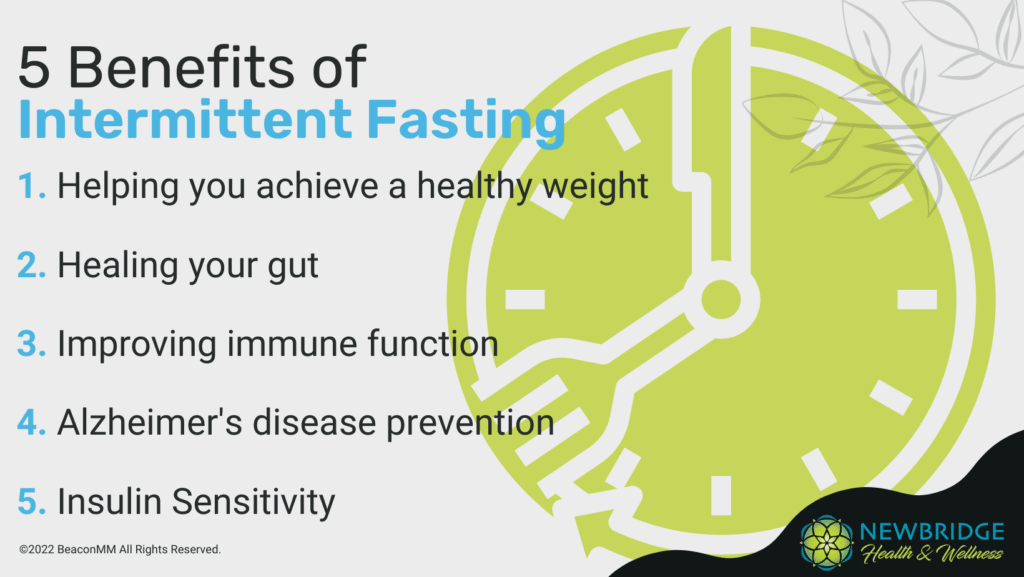Intermittent fasting has been a popular phrase for the last several years in the weight-loss space. It’s also a go-to diet routine for many millennials and has been trending for quite a while. But the question remains, is intermittent fasting good for you? Well, you may be surprised to learn that there are many potential benefits of intermittent fasting, some of which can have positive impacts on your overall health.
A couple major benefits of intermittent fasting are that it is great for detoxing the body and can help reduce inflammation. And as inflammation can be linked to a variety of health conditions, intermittent fasting can become an attractive option to enhance wellness.
Here, we’ll look at five key benefits of intermittent fasting that you should consider.
Are you considering implementing an intermittent fasting routine to achieve greater wellness? Contact the functional medicine experts at Newbridge Health & Wellness today for guidance.
What Exactly Is Intermittent Fasting?
At the most basic level, intermittent fasting is simply a method of designating specific periods of time for eating and for not eating (fasting). And though there are several methods today for intermittent fasting, two of the most popular methods are:
- The 16:8 method – an approach that calls for eating all of your daily meals within a designated 8-hour time frame and fasting for 16 hours.
- The 5:2 method – an approach characterized by eating normally during a five-day period and fasting for two consecutive days.
Intermittent fasting may also require counting calories and only eating a diet of a specific calorie count. However, the intermittent fasting method is defined as abstaining from eating at designated timeframes.
5 Benefits of Intermittent Fasting

With all of the trending diets out there, what makes intermittent fasting so attractive? Well, the fact is that recent research has suggested there are numerous health benefits to gain from intermittent fasting. And in the day and age where the average food options aren’t always the most nutritious or healthy, abstaining from eating during select periods can be quite beneficial in a holistic sense.
1. Achieve and Maintain a Healthy Weight
It’s no secret that most people who begin intermittent fasting do so to begin losing weight, or with the goal of reaching and maintaining a healthy weight. And this is often a reachable goal as some studies have shown that intermittent fasting helped many people to lose 16 percent of their body fat.
It should be noted that if you opt for intermittent fasting with the goal of weight loss, counting calories and eating healthy foods should be part of the regimen. However, a healthy weight also offers numerous benefits as well, such as:
- Lower risk of obesity
- Lower risk of diabetes
- Lower risk of heart disease
While intermittent fasting is attractive for those looking to lose weight, it’s also recommended that you seek out the guidance of a functional medicine practitioner to ensure that you’re healthy enough for a fasting regimen, and to guide you toward the best way to implement this type of fasting routine.
2. Improved Gut Health
Your gut is much smarter than you probably realize. In fact, the human gut is often referred to as the body’s second brain because of the vast number of neurological connections found within the gut. With this in mind, achieving optimal gut health can offer numerous benefits to your overall wellness.
Evidence suggests that intermittent fasting can work to enhance your gut health and positively influence your gut microbiome. This is because fasting ensures that the gut is cleared and “cleaned” between meals. And research suggests that there is a big connection between good gut health and when you eat. Intermittent fasting can also help change the makeup of your microbiome which is thought to have its own circadian rhythm as seen in some animal studies.
3. Improved Immune Function
Believe it or not, improving your immune system might be as simple as engaging in intermittent fasting. When you restrict eating, a process known as autophagy occurs. This is when your body’s cells are deprived of nutrients, oxygen, or if they become damaged.
During autophagy, cells will go into survival mode, and cells will actually eat themselves in order to survive. However, this process can also lead to cells that function more efficiently. And autophagy acts as an immune system stimulator by controlling immune responses and helping to rejuvenate the immune system’s cells.
4. Alzheimer’s Prevention
In several animal studies of intermittent fasting, results have demonstrated disease modification benefits and enhancement of cognition in areas of the brain concerning memory and learning. And fasting in animal studies has also been shown to reduce brain inflammation.
Research in multiple areas suggests that intermittent fasting may be able to delay the onset of Alzheimer’s disease in many animal trials. And though research and testing on humans are still ongoing, the possibility that intermittent fasting may have positive benefits on neurodegenerative diseases is an exciting prospect.
Science has also shown in animal studies that fat metabolism influenced by intermittent fasting leads to the production of ketone bodies. And these ketone bodies have been linked to improved cognition.
5. Insulin Sensitivity
As mentioned, while intermittent fasting can be a valuable weight loss regimen, there may be many benefits to the treatment of insulin resistance as well. And this is great news for patients with diabetes or pre-diabetes.
One amazing fact about intermittent fasting is that a primary benefit is arguably the improvement of metabolic health through the lowering of insulin resistance. And while this effect on insulin levels can work to promote weight loss, this also allows for other benefits of overall wellness.
Insulin is essentially one of the main drivers of fat storage. And if you’re constantly eating, you’re promoting insulin production throughout the day. The problem here is that when you’re constantly producing insulin, the body’s cells begin to resist it, thus the body has to produce more insulin. However, fasting allows the body’s insulin levels to drop which not only helps burn fat but also helps to lower your risk of disease.
Is Intermittent Fasting Right For You?
While we’ve discussed a few of the potential benefits that intermittent fasting can offer, you may be wondering if intermittent fasting is right for you. Perhaps weight loss isn’t your overall goal. And if this is the case, there are several other benefits that should be mentioned as well.
For example, intermittent fasting has been shown to:
- Change, repair, and rejuvenate cell function
- Reduce oxidative stress
- Reduce inflammation
- Improve blood sugar levels
- Improve blood pressure
- Improve heart health
- Lower cholesterol
- Improve cognitive function
- Offer cancer protection
- Increase longevity
- Improve sleep quality
As you can see, the possible benefits that you could potentially gain from intermittent fasting are diverse and promising. And this is a big reason why intermittent fasting is so popular. However, before you decide to take on any type of diet regimen, a full holistic examination is recommended to ensure that intermittent fasting is safe for you.
Functional medicine provides a holistic way to improve overall wellness. And speaking to a functional medicine doctor can help you to devise a health plan going forward. If intermittent fasting is something that you’re interested in pursuing, a functional medicine practitioner can help guide you along your health journey.
Ready to see if an intermittent fasting routine is right for you? Contact the functional medicine experts at Newbridge Health & Wellness today to learn more.


